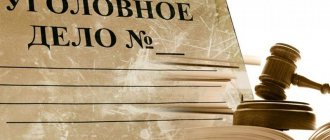The detection and subsequent investigation of crimes are primarily the responsibility of the police department and the prosecutor's office. Relatively recently, significant changes and additions have been made to the legislation regulating these issues. They are mainly related to the new Code of Criminal Procedure, which came into force on July 1, 2002. Next, we will look at what the preliminary investigation bodies are. The powers and their purpose will also be described in detail in the article.
Preliminary investigation and inquiry bodies: characteristics
There is quite a lot in common between these structures. In this regard, they are quite often confused. Actually, this is not surprising. Preliminary investigation and inquiry bodies have essentially the same purpose. If signs of a criminal act are identified, department employees are obliged to initiate a criminal case into this fact. Their work is based on the uniform requirements of the Code of Criminal Procedure.
Preliminary investigation bodies carry out measures to identify, verify, and record evidence. Employees also analyze them. The same tasks are performed by the bodies of inquiry. At the same time, these activities are carried out by various officials and departments regarding various crimes. Thus, the inquiry is carried out by investigators, and the preliminary investigation is conducted by investigators. They have different scope of possibilities within the framework of a criminal case.
General procedure
If there is a need to extend the period of the preliminary investigation, authorized persons must comply with procedural requirements. In particular, in order for the prosecutor of a republic, region, territory or other subject of the Russian Federation to receive a corresponding request, it, together with the materials, is sent no later than seven days before the end of the period established by law. In this case, the petition must be certified not only by the investigator, but also by the official supervising the progress of the process.
If addressed to the Prosecutor General, then it must be sent no later than 10 days. before the end of the specified period. The period for conducting a preliminary investigation when returning materials for additional study, resuming a terminated/suspended process is determined by the prosecutor performing supervision, within 1 month. Subsequent increases in the period are carried out according to general rules. If the issue is being resolved regarding the procedure within which the accused is in custody, then it is necessary to follow the procedure provided for in Article 109 of the Code of Criminal Procedure.
Department structures
To the bodies of inquiry, in accordance with Art. 40 of the Criminal Code, include:
- Chief Bailiff of the Russian Federation.
- ATS of the Russian Federation.
- Operational units of the FSB of the Russian Federation.
- Chief military bailiff.
- Federal Border Service.
- Chief bailiffs of the constituent entities of the Russian Federation.
- Commanders of formations, military units.
- Senior bailiffs of the Constitutional, Supreme and Higher Arbitration Courts.
- Fire service authorities of Russia.
- Heads of military garrisons or institutions.
Preliminary investigation bodies in Russia include employees:
- Prosecutor's office.
- ATS.
- FSB.
Under certain circumstances, the preliminary investigation is conducted by the heads of the investigative units of the prosecutor's office.
Nature of events
When investigating a criminal case, the investigating authorities must act in two directions:
- Carry out activities that collectively form the actual inquiry.
- Start urgent actions.
It must be said that in the overwhelming majority of criminal offenses, these activities are carried out by the police. Urgent actions are carried out immediately after the initiation of a case, in which a preliminary investigation is mandatory. Only in this case is it possible to quickly detect and record traces of an offense, collect evidence that requires immediate confirmation, study and seizure.
The inquiry is carried out according to a simplified procedure of procedural forms and is distinguished by a significantly shorter time frame in comparison with the preliminary investigation. So, according to Art. 15 of the Criminal Code, activities must be completed after 15 days from the date of initiation of the case and before a decision is made to send the case to the prosecutor. The latter may extend the period, but not by more than ten days. After the investigator has carried out the necessary activities, the case is transferred to the investigator. He will carry out further study in accordance with the established procedure.
Preparing for a court hearing
This stage is the first in judicial proceedings; during its implementation, the judge determines whether there are procedural conditions for scheduling a court hearing. In domestic criminal proceedings it can be expressed in two forms.
- General preparation procedure. In this case, the following types of tasks are performed: control and audit (checking whether the prosecutor has complied with procedural conditions), law enforcement (whether submitted petitions, complaints to cancel or change the preventive measure, etc. are subject to satisfaction), administrative.
- Preliminary hearing. It can be held at the initiative of the judge or at the request of the parties in certain cases. As a result, a decision is made to return the case to the prosecutor, send it to jurisdiction if necessary, terminate or schedule a full court hearing.
Competence of preliminary investigation bodies
The list of cases for which activities are carried out by these units is provided for in Art. 150 CC. The same article establishes jurisdiction. The provisions define specific categories of crimes that are subject to study by employees of different departmental affiliations.
Investigators of the prosecutor's office are thus authorized to investigate cases that involve attacks on the constitutional freedoms and rights of citizens and people, their health and life; FSB officers are the most dangerous acts against the security of the state system and society; representatives of the Department of Internal Affairs - illegal actions against order, property, established rules for the operation of transport, and others.
A special case
The judge, inquiry officer/investigator, as well as the prosecutor who received a request to restore the missed period must make appropriate decisions (decisions). Acts must be adopted both in case of satisfaction and in case of refusal. The decisions made, in turn, can be appealed to the court located at the place of the preliminary investigation. Consideration and resolution of complaints is carried out by a single judge no later than 5 days from the date of receipt. The applicant (his representative or defense attorney), as well as the prosecutor, are summoned to the hearing. The judge's decision can be challenged in a higher authority. If there are grounds, the judge may restore the deadline that was missed. Information that the execution of the decision has been suspended due to the satisfaction of the complaint is indicated in the relevant resolution.
Primary requirements
The system of preliminary investigation bodies is endowed with certain capabilities that ensure its procedural independence. Employees have freedom to make decisions related to the progress of the proceedings and carry out necessary activities within the framework of the case. In cases provided for by law, decisions made by preliminary investigation bodies acquire force only after receiving the sanction or consent of the prosecutor or the court to take certain measures. This could be, for example, termination of a case, taking a detainee into custody, releasing the accused on bail, extending the period of his detention, a search, etc.
Appeal review
If the parties are not satisfied with the result of considering the materials of the criminal episode or the size and nature of the imposed punishment, they have the right to appeal the verdict.
A distinctive feature of the stage of appeal proceedings is that a higher authority does not conduct a judicial investigation when a complaint is received from a convicted person (representation of a prosecutor). At this stage, the correctness of the decision of the lower court is verified based on the case materials alone.
An important nuance of the appeal stage indicates that the court of second instance should not go beyond the requirements set out in the petition. That is, a higher judge does not have the authority to request additional materials and conduct other investigative actions.
The result of consideration of the appeal (submission) may take the following forms:
- the judicial act remains unchanged;
- the sentence is overturned;
- the size or nature of the imposed punishment changes.
The appeal decision comes into force immediately after it is issued.
Rights and obligations
The prosecutor gives written instructions in each criminal case. Preliminary investigation bodies comply with these instructions without fail. However, there are situations when employees do not agree with one or another instruction. In this case, the investigator has the opportunity to refer the case to a higher prosecutor for consideration. In this case, the employee must express his objections in writing.
If the arguments are considered convincing, the previous orders will be canceled by the superior prosecutor. If they seem not strong enough, the case will be transferred to another employee. Preliminary investigation bodies, in addition to procedural independence, have certain powers. They have the right to give written instructions to employees of other departments on the implementation of operational investigative measures within the framework of a specific case under investigation. Resolutions adopted by the bodies carrying out the preliminary investigation are mandatory for execution by all institutions, enterprises, citizens, officials, and organizations.
Supervisory proceedings
The end of the competition between the parties comes at the moment when the verdict, whatever it may be (acquittal or conviction), comes into legal force. As a result, the prosecutor cannot return again to the issue of the criminal liability of the person in respect of whom the court decision was made. But the accused, on the contrary, has the right to raise the issue of reviewing the sentence in his favor. This process in domestic criminal law is called “judicial supervision”. In essence, it is something like an audit of a court decision for errors.
Operational search activities
The activities of preliminary investigation bodies are regulated by the Criminal Code. At the same time, operational-search activities are based on a slightly different legislative framework. In addition to the Federal Law of July 5, 1995, regulation of these activities is carried out on the basis of a number of departmental by-laws. At the same time, there are some procedural differences. Thus, the preliminary investigation bodies of the Russian Federation begin their work within the framework of the case only after its initiation. Operational search activities are not limited to this. They can be carried out even if there is information about the preparation of a crime, but without sufficient data to make a decision on initiating a case. Also, operational search activities can be carried out when there are reports of missing persons or the discovery of an unidentified corpse.
Pre-trial stages
The pre-trial stages of the criminal process are the first steps in identifying the perpetrators and bringing them to justice. The outcome of the proceedings as a whole directly depends on what pre-trial investigation scheme will be used and how it will be carried out. The reason for checking information about the commission of a crime is a statement from citizens or a determination of the crime in fact. The purpose of the pre-trial investigation is to collect all kinds of evidence confirming the fact of the crime, to identify persons who may be involved in the commission of the crime, as well as to carry out other procedural actions.
Only after a certain base of information has been collected and the elements of the crime have been established, can a criminal case be initiated. It should be noted that only when criminal proceedings are initiated, it is possible to carry out investigative actions and move to other stages of legal proceedings.
The stage ends with a decision to initiate a criminal case or a refusal to initiate one. If there is no evidence of a crime, then the investigation is terminated.
The second stage - investigation, begins with an inquiry, investigative experiments and other procedural actions aimed at fully solving the crime. All materials collected at the first stage begin to be checked for veracity - interviews are conducted with people who could have witnessed the criminal act, as well as the victim and the suspect. The actions of the accused are assessed, the circumstances that contributed to the violation of the law are considered, and the amount of damage caused is determined.
The procedure for proving the guilt of a suspect is controlled by the prosecutor; Before sending the case to court, the prosecutor is obliged to check the case materials for errors and establish the fact that the inquiry was conducted correctly. When obtaining information, physical force or mental pressure should not be used; everything must be done in accordance with established legislation. All documentation must be drawn up according to clear templates. The slightest mistake or inaccuracy serves as a reason to return the case materials to the investigator for further investigation and correction.
The task of the prosecutor at this stage of the proceedings is also the correct application of the article of law that reflects the illegal action. The indictment must contain a certain amount of punishment; it must correspond to the committed action of the defendant and be within the limits of the article charged with him.
The final decision at this stage of proceedings is the termination of the case, drawing up an indictment and sending the case to trial or a decision to apply compulsory medical measures.
Supervision
The system of preliminary investigation bodies is located in the prosecutor's office. Employees of departments are obliged to comply with all its instructions in one or another matter. Procedural control can also be exercised by the heads of direct investigative departments. They have the right to check the case materials, give instructions to employees on the direction of studying the crime, taking the necessary measures, bringing persons as defendants, choosing a preventive measure against detainees, the scope of the illegal act and its qualifications. All orders must be submitted in writing. However, employees can appeal them to the prosecutor. Investigators from the control and methodological department of a higher unit also have the right to carry out departmental supervision. During the consideration of cases, judicial control over the legality of the activities carried out is also carried out. Complaints about the refusal to initiate an investigation, its termination and other actions (inactions) of the prosecutor, investigator or inquiry officer that may infringe on the freedoms and rights of the parties to the proceedings or impede civilians’ access to justice are also checked.
The concept of stages of criminal proceedings
The concept and system of stages of the criminal process is defined as a set of procedural actions that form an independent stage in the criminal process. The main stages of the criminal process can be represented as a kind of steps towards achieving the main goal. The investigation moves precisely along these steps, and, ultimately, legal proceedings occur.
The stages of a criminal case are necessary to clearly distinguish between actions related to preventing and combating crimes. Each of the stages is regulated by legal norms, but they do not always operate in everyday life; they acquire their force only in legal proceedings.
All stages of criminal proceedings include immediate tasks that must be solved, a certain circle of participating persons with authority. The stages of criminal proceedings also consist of procedural actions necessary for recording the case materials and the specific nature of the procedural relations that arise between the subjects. All stages of the criminal process of the Criminal Procedure Code end with the adoption of some procedural decision; it is this decision that serves as the reason for moving to a new stage.
To better understand the topic, a table of the stages of the criminal process is often used. In general, five stages of criminal proceedings are considered:
- Initiation of criminal proceedings.
- Inquiry and preliminary investigation.
- Bringing the case to trial.
- Trial.
- Appeal proceedings.
The concept and system of stages of criminal proceedings is significantly simplified if the classification includes two main processes - pre-trial and judicial. The pre-trial process includes:
- Initiation of a criminal case.
- The investigation is preliminary.
The trial process combines:
- Preparation of case materials for consideration in court.
- Proceedings in the court of first instance.
- Proceedings in courts of second instance.
At the stage of pre-trial investigation, the main role belongs to the investigator and interrogating officer, who must collect all kinds of evidence and evidence confirming a person’s guilt. No citizen should be brought to trial without compelling reasons and proof of his guilt. At the judicial stage, the main role is assigned to the judge, who is obliged to study the case materials, check for errors in the investigation and make an honest, objective decision.
There are also exceptional stages of the criminal process; they consist of reviewing a sentence that has already entered into legal force. This is a completely independent stage of the criminal process, but it exists only within certain circumstances. Criminal proceedings may be resumed due to newly discovered circumstances or during supervisory proceedings.
Control Features
During the investigation, the relationship between the preliminary investigation bodies of the Russian Federation and the prosecutor's office is procedural, not administrative, in nature. Prosecutor's control does not deprive employees of independence. On the contrary, a superior official should increase it along with an increase in responsibility for the legal and timely implementation of necessary activities within the framework of the case, its disclosure, while avoiding petty supervision of a lower-ranking employee.
When the prosecutor participates in identification, inspection of the crime scene, carrying out investigative experiments, and presence during interrogations of the accused, witnesses or victims, he should not and cannot replace the investigator and take on his tasks. However, if there are questions for those being interrogated, the prosecutor can ask them. This should be reflected in the appropriate protocol. In procedural documents for any investigative action, the participation of the prosecutor is necessarily recorded.
Return of materials
In the event that the court sends the case back to carry out additional investigative measures, when resuming terminated/suspended proceedings, the period is set by the decision of the prosecutor who is authorized to supervise the process - 1 month. Subsequent expansion of the period limits occurs according to the general rule. If such a need arises, the employee carrying out additional procedures within the framework of the prosecution makes a decision to extend the period of the preliminary investigation. This act must be sent to the head of his department no later than five days before the end of the previously established period. In addition, the employee is obliged to notify the accused and his defense attorney, the victim and the representative of the decision made.
Rights and responsibilities of the prosecutor
The actions of a superior person are considered incorrect if, while present at the crime scene during an inspection or an investigative experiment, he gives orders to the investigator, who, in turn, only carries out the procedural formalization of the actions. The prosecutor can interfere in the course of the process when the investigator commits any violations of criminal norms and the law, procedural errors, or leaves unclear circumstances that are important for the trial of the case.
If a superior official has taken over the entire production, he is responsible for the objectivity and comprehensiveness of the process. When checking a criminal case, the prosecutor pays attention to the quality of the investigation, its completeness, and gives instructions that must be followed. However, these actions should not limit the procedural independence of a lower-ranking employee. The investigator cannot be placed in such conditions under which he must carry out instructions contrary to his inner convictions.
Cases in which an employee may disagree with the instructions of the prosecutor are given in Art. 36, part 3. These include instructions on bringing a citizen to participate in the case as an accused, the scope of the charge and qualification of the crime, detention, choice of a preventive measure, sending the case to court or closing it. The above actions are considered decisive in criminal proceedings from stage to stage. However, this does not mean that the prosecutor does not have the right to resolve these issues after the completion of the investigator’s work. According to Art. 385 of the Criminal Code, after receiving the case with the indictment, he may terminate the proceedings on it for any reasons given in Art. 83, 84 CC. The prosecutor has the right to exclude certain episodes from the charge, apply a regulatory act on a less serious offense, and make other decisions within the framework of this proceeding. The implementation of the above measures is no longer associated with the principle of investigator independence in procedural terms. These decisions are made by a superior official regardless of the position of the employee, whose work is considered completed by that time. The prosecutor has the right to both participate in the preliminary investigation and inquiry, personally, if necessary, carry out certain activities, and, having initiated a case or taken it into his possession, investigate it in full independently. He certifies his participation in the events, recorded in the protocol, with his signature.
Trial stage
The concept of the preparatory process of considering a case in court is essentially the same study of evidence, only based on the fact of collected and systematized materials. The content of the materials is examined by the judge who will consider the case at the hearing.
The preparatory stage is necessary in order to fully ensure the preservation of the rights and freedoms of the accused and the victim. The judge determines whether the prosecutor brought the charges correctly and legally. Is there enough evidence to bring to justice, and can the accused even answer before the law, due to his age and mental health?
If the prosecutor has fully fulfilled his duties and complied with the law in preparing the case, then the judge accepts it for consideration, a corresponding resolution is issued and a trial date is set.
The trial in the court of first instance takes place in compliance with all principles of justice. The case materials are examined on their merits, the parties are questioned, arguments take place, and the judge decides whether a particular person is guilty of a crime or not. Mitigating and aggravating circumstances in the case, the behavior of the defendant during the investigation, as well as the rules of the law that were violated by the accused must be taken into account.
It is very important to note that pleading guilty does not exempt a person from trial; in fact, it does not matter at all. Only his cooperation with the investigation plays a role
It is the judge's job to get to the bottom of whether he is guilty or not. If the parties notice that the judge is making subjective decisions, they can demand his removal at this stage. Sometimes a motion for recusal is nothing more than a ploy to delay the sentencing and, while the case is suspended, to collect more evidence or bribe new witnesses. The result of the trial is a court decision or decree that comes into force within 10 days.
The execution of the sentence may be delayed if the parties are not satisfied with the outcome of the trial. Everyone has the right to appeal the decision in a court of second instance. Not only the parties involved in the process, but also the prosecutor can submit an application.
The difference between an appellate court and a district court is that it does not find the accused in the case; it examines the correctness of the decision made by the court of first instance. The appellate court can leave the sentence unchanged, can overturn it, change it, or assign a new one, it all depends on the specific situation. The decision of the court of second instance is binding. It can only be appealed in the Supreme or International Court, although not all cases are considered by these authorities.
To summarize, we can say that the importance of the stages of the criminal process is very great, not only in legal proceedings, but throughout criminal law. The existence of stages of production at the legislative level facilitates the implementation of any criminal process, and helps to control the level of legality in the activities of law enforcement agencies.
The role of structure
The functions of the preliminary investigation bodies include the protection of state interests, public order, civil liberties and rights. By solving cases, service employees fight crime in general. Preliminary investigation bodies are units vested with executive power. Their employees try to do everything to remain worthy of the trust of the civilian population. The tasks of the preliminary investigation authorities require the continuous expansion and interaction of existing law enforcement services, as well as the improvement of the working methods used. The leadership of the Ministry of Internal Affairs attaches great importance to the efficiency and development of the structure.
The main attention in organizing investigative activities is paid to improving the skills and professional level of employees, their ability to conduct and organize investigations efficiently and competently. Thanks to the existing legislative framework, the sphere of influence of the structure is quite wide. Thus, on the basis of jurisdiction established by regulations, employees of the structure carry out preliminary investigations in cases of more than 70% of crimes committed in the country.
Of these, more than 91% are economic offenses. Only highly qualified professionals can solve many of these cases. Employees of the structure always see their duty in the ability to adequately respond to the challenges of the time, raise their level, improve techniques and methods, and introduce scientific progress into their work. The work of investigators is hard enough. Its importance is difficult to overestimate, especially now, when crime is becoming more violent, which often manifests itself in terror and violence.





